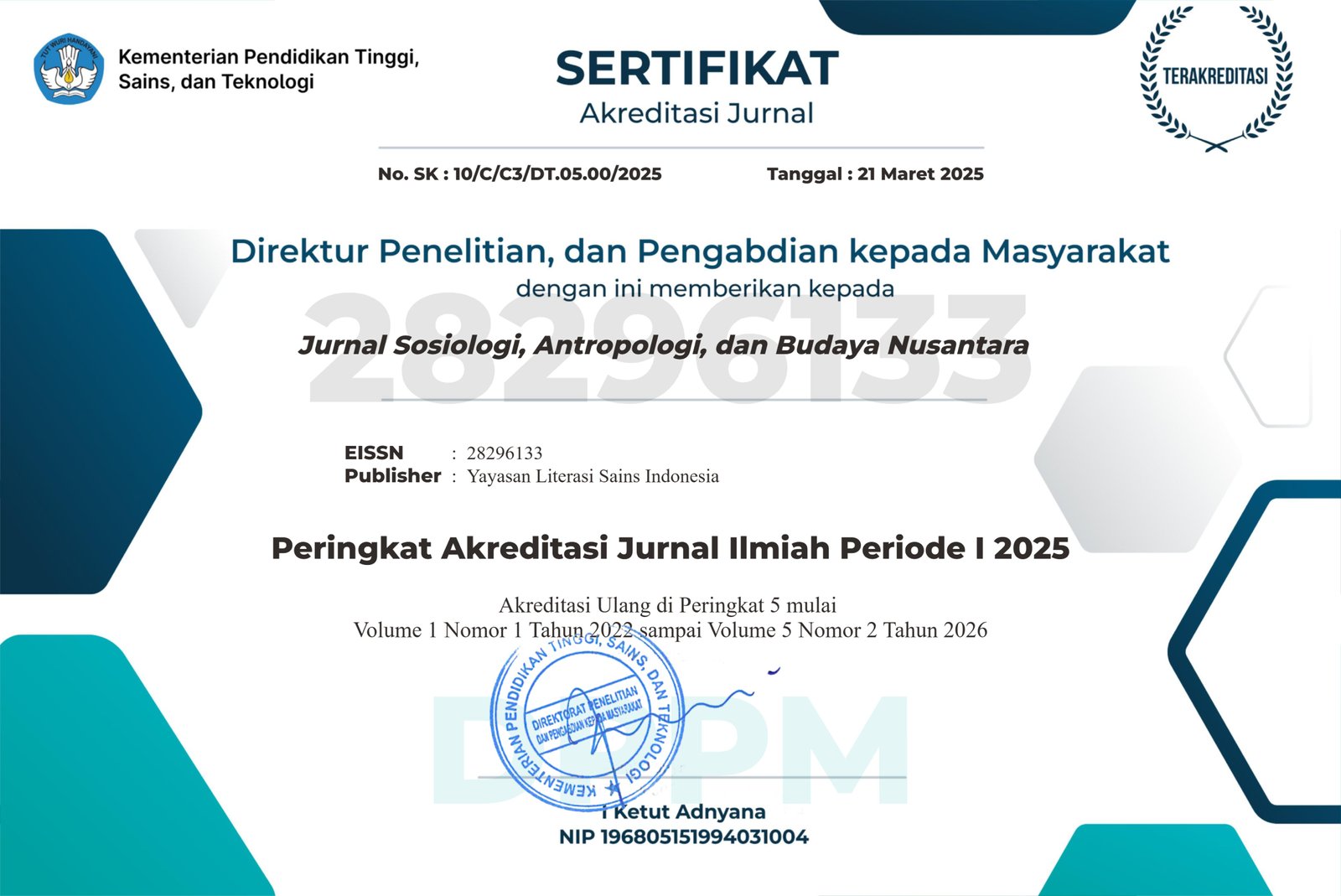KONTRUKSI SOSIAL : FENOMENA PERNIKAHAN DINI DALAM REALITAS SOSIAL MASYARAKAT DESA
DOI:
https://doi.org/10.55123/sabana.v2i1.1846Keywords:
Construction, Early-Age Marriage, RealityAbstract
The socio-cultural construction of the village community regarding early marriage has been going on for a long time. In the early stages, of course, there will be matchmaking and then a binding session between women and men to the stage of legal marriage in a reality. Since the beginning, parents have made arranged marriages that can lift the family's economy, which has not yet risen. A portrait of the cultivation of social values related to the phenomenon of early marriage makes a cultural reflection of the village community. The methodology we use in this research is a qualitative method with a phenomenological approach through observation and interviews to obtain information directly. Interview informants in the study, P3N (Maid for Marriage Registrar) Kemuning, P3N (Assistant for Registrar of Marriage) Antirogo, Head of RT 002 RW 002. The research uses Peter L. Burger and Luckmann's theory of social construction. The results of the study can be examined through three concepts of social construction theory, first, externalization which shows that a culture in each region is able to improve the economy in marriage here and be free from the bad side of promiscuity. Second, objectification provides a space and limits for village communities to conduct early marriages because of the regulations bound by the government as a minimum age of marriage. Third, the internalization of the community in early marriage makes a reality that encouragement from the family can become a social construction that early marriage is a natural thing. However, with the attachment of state regulations, the community is quite aware of the risks of early marriage even though there are still those who legalize early marriage in a siri marriage bond.
Downloads
References
Creswell, J. W. (2015). Penelitian Kualitatif & Desain Riset : Memilih diantara Lima Pendekatan. Yogyakarta: PUSTAKA PELAJAR.
Peter L. Berger dan Thomas Luckmann. (2018). Tafsir Sosial Atas Kenyataan. Jakarta: LP3ES.
Hakim, L., Suhartini, E., & Mulyono, J. (2013). FAKTOR SOSIAL BUDAYA DAN ORIENTASI MASYARAKAT DALAM. https://repository.unej.ac.id/bitstream/handle/123456789/58739/Lukman%20Hakim.pdf?sequence=1&isAllowed=y
Islamiyah, S., & Mulyono, J. (2019). KONSTRUKSI PENGETAHUAN TENTANG SHOLAWAT PADA ANGGOTA PENGAJIAN SHOLAWAT “BHENNING” SITUBONDO. http://download.garuda.kemdikbud.go.id/article.php?article=1283785&val=17182&title=KONSTRUKSI%20PENGETAHUAN%20TENTANG%20SHOLAWAT%20PADA%20ANGGOTA%20PENGAJIAN%20SHOLAWAT%20BHENNING%20SITUBONDO
Saputro, F. B., & Mulyono, J. (2012). Pelestarian Kearifan Lokal Masyarakat Desa Pakraman Tenganan Pegringsingan Dalam. https://repository.unej.ac.id/xmlui/bitstream/handle/123456789/56278/Fajar%20Bagus%20Ekanda%20Saputro%20-%20080910302051_1.pdf?sequence=1&isAllowed=y
Abadylla, H. I. (2015). Pengaruh Lingkungan Kerja Karakteristik Individu dan Motivasi Terhadap Kinerja Karyawan (Studi Pada Perguruan Tinggi Swasta IKIP PRGI Jember). Jurnal Ilmiah Mahasiswa Fakultas Ekonomi Dan Bisnis, Vol. 4(No. 1), 1–14.
Fawzi, M. G. H., Iskandar, A. S., Erlangga, H., Nurjaya, & Sunarsi, D. (2022). STRATEGI PEMASARAN Konsep, Teori dan Implementasi. In Pascal Books. http://repository.ibs.ac.id/id/eprint/4973
Downloads
Published
How to Cite
Issue
Section
License
Copyright (c) 2023 Anjelina Putri Aisyah, Ghebi Parwati, Muhamad Imam Prabowo

This work is licensed under a Creative Commons Attribution 4.0 International License.


























